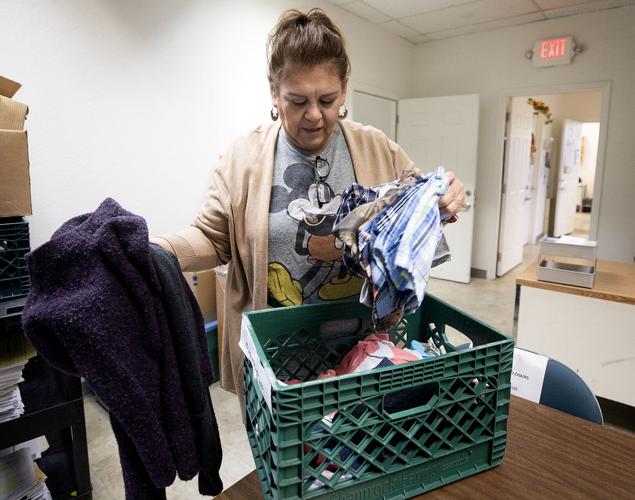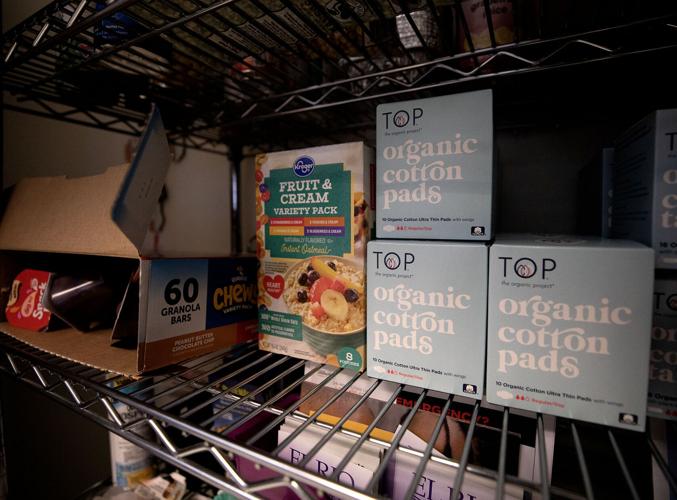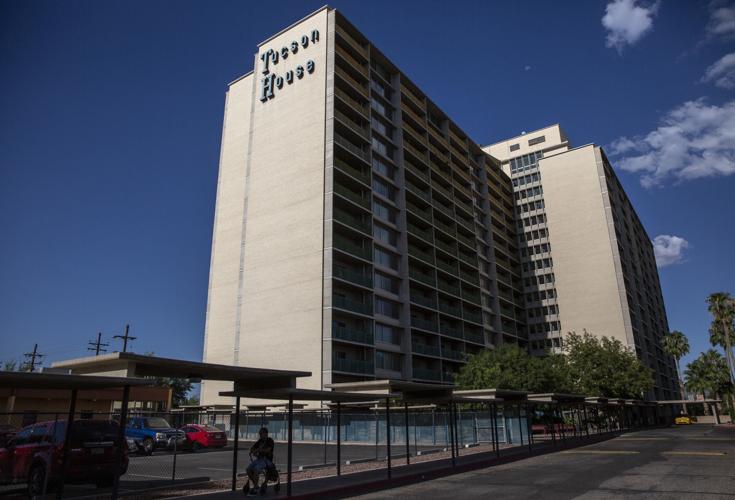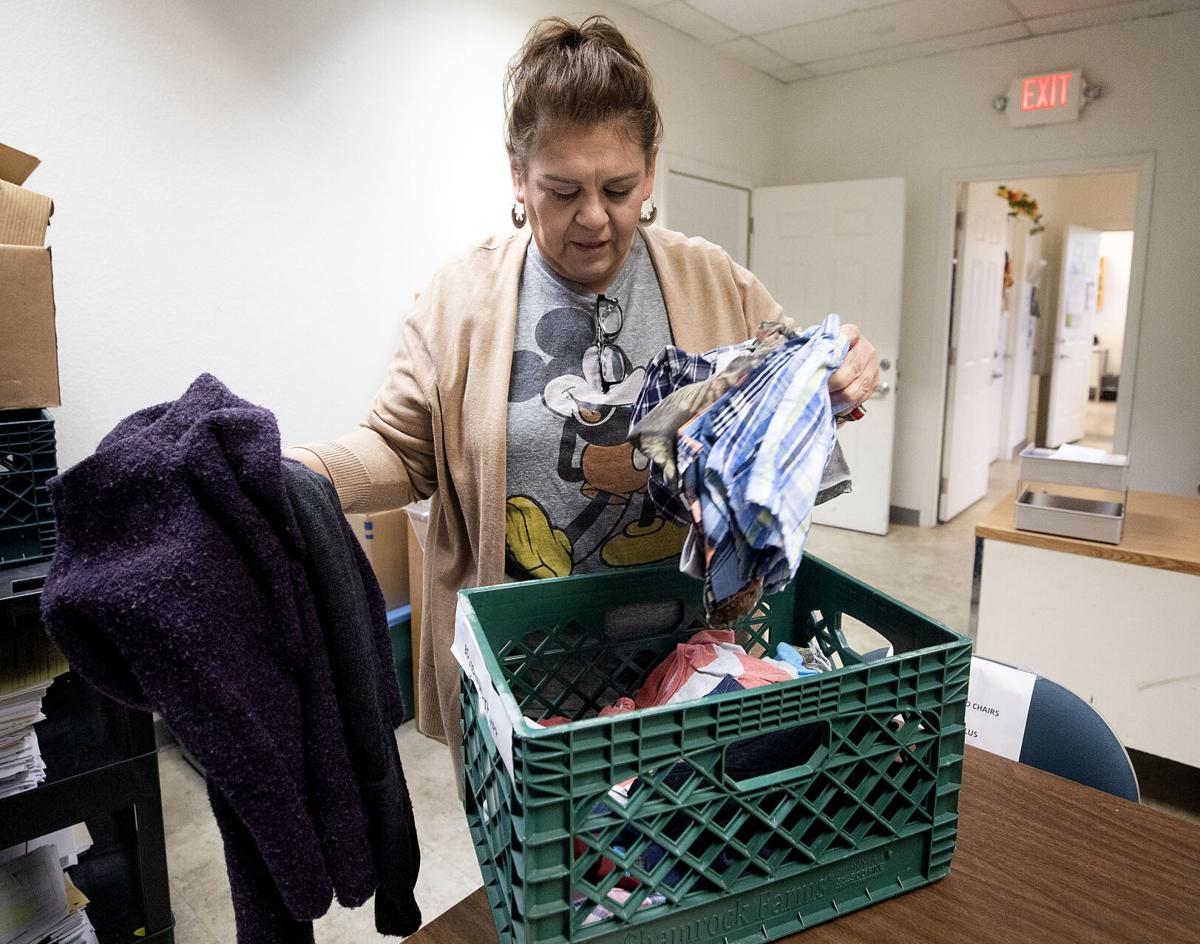There are more than 400 residents at Tucson House, the city's largest public housing community, but only 20 are school-aged.
This realization changed the way Tucson House does business, thanks to a student working there this summer through an Arizona State University social services program.

When parents seeking backpacks and other items from the low-income residence's supply of donations came up empty, Marisol Peralta sprang into action, rallying the community to ensure the student residents had what they needed for the new school year.
Staffers and volunteers are now mindful of the specific needs of the young residents they serve, who only recently arrived as the housing site's clientele changed somewhat.
These days, kids and teens are no longer an afterthought at Tucson House, but instead a celebrated part of the community, with plans to create a space just for them, as well as programs and activities to amplify their voices.
'Seeing that relief ... was just great'
ASU student Peralta, who wants to be a school social worker after she graduates, said she's always been interested in helping children. She was hoping for an opportunity when she started working at Tucson House in May through ASU's Tucson Community Access, Referral and Education Services for Health program.
"That's always been my thing, advocating for children and just being there for them and giving them a voice and supporting them in any way that I can," Peralta said.
With only a small percentage of residents falling into that age group, she wasn't sure opportunity would arise.
But when parents started coming in seeking back-to-school supplies, Peralta got her chance. She asked Denise Lopez, who oversees operations at Tucson House, where she could find supplies.
"She said that was going to be my work and if I wanted the stuff, I'd have to get my own resources," Peralta said. "So I started calling local businesses and places."

Tucson House is the city’s largest public housing site.
Peralta found many organizations were already participating in back-to-school drives and didn't have supplies to spare, so she asked her supervisors at ASU for help.
The school shared the flyer for her donation drive on social media and Peralta hit the pavement, posting it around town and at ASU's Tucson campus. She made phone calls soliciting donations and visited two businesses in person, finding help in a variety of places.
"A girl that does eyelashes and has another business had a box full of supplies for me, and I got connected to someone from Pima County," Peralta said.
El Rio Community Health Center's Reproductive Health Access Project and Tucson Diaper Bank provided menstrual kits for girls, and the Tucson Fire Department's TC3 program committed to providing ongoing supplies, including toys, pens, markers and crayons to Tucson House's growing child and teen population.
When Peralta had all the supplies gathered, including backpacks, binders, writing materials, and any other item on the students' back-to-school supply list, she assembled a pack for each child, customized for their gender and age. From there came the best part: Delivering the packs to their new owners.
"Seeing that relief, most of it from the parents, when we'd give them the backpack and say it's full of stuff, was just great," Peralta said. "And most of the kids got a bag of hygiene supplies, dependent on their age."
As an unexpected bonus, Peralta continued to receive calls from people wanting to donate, even after the drive was over and school had started. Lopez now keeps a supply of school products and other items for young residents in her office, ready for any youth who comes her way.
The ASU program aims to address health and wellness inequities at Tucson House. The program runs in collaboration with the University of Arizona Department of Family and Community Medicine, with teams conducting on-site health and wellness assessments to identify unmet mental and physical health needs.
'Responding quickly with our amazing contacts'
In addition, Tucson C.A.R.E.S. employees connect residents to services and resources. They also work with community partners to bring services and activities to Tucson House, including healthy food demonstrations and pop-up pet vaccine clinics.

Denise Lopez, community services project coordinator for Tucson House, says she has shelves with some products to handout, but needs more.
Tucson C.A.R.E.S. was created after community members expressed a need for such help, and eventually called for on-site assistance.
The grant-funded program is in its last year, and pays for student employees to spend two to three days a week embedded in an office at Tucson House. Students in the UA's Department of Family and Community Medicine handle physical health assessments, while ASU students cover social service and mental health needs, said program coordinator Bob Purvis.
Their services run the gamut from food assistance and eviction prevention to reading to people with eyesight issues or who are illiterate, Purvis said.
In its first year, Tucson C.A.R.E.S. made almost 700 resident referrals to various service providers, with 120 residents serving as repeat clients.
The program is staffed by Purvis and two part-time student workers.
"If we could get some additional funding at Tucson House, we could spread to public housing in other places" and expand staffing, Purvis said.
Tucson C.A.R.E.S. is an initiative of ASU's Office of Community Health and Resiliency. Its creation was spurred by COVID, as workers initially partnered with the UA and the Pima County Health Department on one of the first door-to-door vaccine rollouts.
"That was how they say how we might fill this gap," Purvis said. "And to be impactful at Tucson House. You're not going to find a more impactful place. We're bringing things on site and eliminating obstacles to service like transportation and lack of mobility."
The program also fills a need for students looking for real-world experience working with special populations, but also draws students with prior real-world experience in specialties of their own.
Tucson C.A.R.E.S. student worker Zoe Somerville also showed initiative, organizing a drive to collect warm clothing and blankets for residents, Purvis said. A previous employee of YWCA of Southern Arizona, Somerville tapped into her connections and secured the group as a community partner in the drive, gathering 1,500 pieces of clothing and 250 blankets.
"That's what the program is all about: Seeing the needs being presented by residents and responding quickly with our amazing contacts," Purvis said.
'You never know what people go without'
Tucson House was acquired by the city in 1979 and converted to public housing for the elderly and people with physical and medical challenges.
But during the early years of the COVID pandemic, the city began moving unhoused individuals into the high rise, which continues to be used — along with the nearby Wildcat Inn — as transitional housing for people who were formerly homeless. Both properties are located on North Oracle Road, between West Drachman Street and West Grant Road.
With the new types of residents also came kids and teens living with their adult families.
"I really kind of did not pay much attention to kids, because you don't see them and they don't advocate for themselves," said Lopez, who oversees Tucson House operations as a community services project coordinator for the city's Housing and Community Development. "When most of my people need something, they'll come to the office and get me. But these are kids, so I really don't see them."
When Peralta told Lopez about her desire to help Tucson House's kids get ready for the school year, Lopez said it was an easy "yes."
The challenge came in getting parents to admit they needed help, since many don't want to give the impression they're lacking.
"You really have to lean in sometimes and you kind of have to prove yourself and earn that trust to be able to have that conversation," Lopez said.
She had the conversations and was able to compile a list of students and needed supplies. Lopez also reached out to her connections, gathering supplies from the Tucson Fire Department and arranging for the menstrual product donations. Her friends chipped in, too, providing body sprays, lip glosses and more.
"Those are little luxuries that typically they would not be able to afford to get. But to give them a little bit of normalcy, to me that was important," Lopez said. "You have to be resourceful with the things that come your way."
Lopez now collects children's clothes, toys and other items for Tucson House's kids. She collects everything offered.
"You never know what people go without," Lopez said.
She also opened up Tucson House's clothing closet to some of the kids, so they could start off the school year with new clothes.
While students were happy with all they received, Lopez said there was a touch of embarrassment, since they were aware of the charity behind the effort.
"I think that if we can get to the point that we're celebrating their youth, it's not necessarily a charity anymore as much as, 'Oh my gosh, you're a Tucson House student. This is for you.' Then there's some pride in coming from where you live at," Lopez said.
She hopes to continue to work with Tucson C.A.R.E.S. to expand options for the young residents, including creating a space just for teens. She's also started working with the Wildcat Inn to ensure its young residents have what they need.
"Having this population of kids, of young adults, for me, they're very special," Lopez said. "I want them to prosper, I want them to do well and I want them to love that they live at the Tucson House."
This national chain is moving across the street in midtown. Gabriela Rico / Arizona Daily Star








